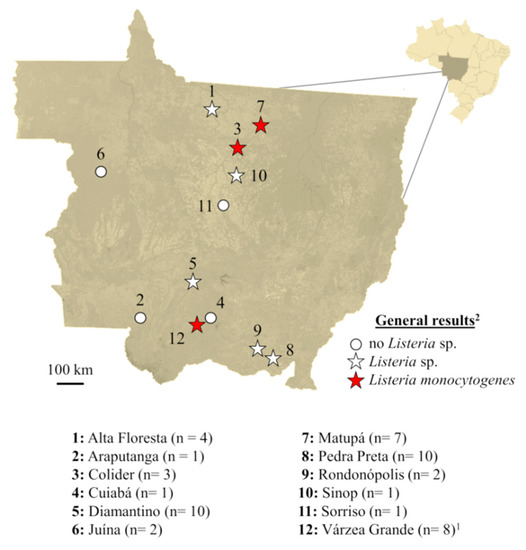The state of Mato Grosso is the largest producer and exporter of beef in Brazil. A study published in Journal Microorganisms estimates the prevalence of Listeria monocytogenes (LM) in export-approved beef from the state and to characterize the isolates. A total of 50 samples analyzed, Listeria sp. was isolated in 18 (36% prevalence). Listeria monocytogenes was confirmed in 6 (12% prevalence). Among the serotype groups assessed by multiplex PCR, serotype 4 (4b, 4d or 4e) was the most prevalent. Listeria monocytogenes isolates were susceptible to most used antibiotics, although high rates of resistance were detected to sulfonamides, cefoxitin, and cefepime. A high level of resistance to the disinfectant sodium hypochlorite was detected in different strains. Researchers said more intensive measures of cleaning and disinfection must be adopted by the beef processing industry of Mato Grosso. @ https://www.mdpi.com/2076-2607/8/1/18/htm
Characterization of Listeria monocytogenes in Export-approved Beef from Mato Grosso, Brazil
The Brazilian state of Mato Grosso is the largest producer and exporter of beef in the country, but few studies of relevance have been conducted to evaluate the microbiological safety of its products. This study aimed to estimate the prevalence of Listeria monocytogenes (LM) in export-approved beef from Mato Grosso and to characterize the isolates in terms of molecular properties and antimicrobial resistance. From a total of 50 samples analyzed, Listeria sp. was isolated in 18 (36% prevalence). Listeria monocytogenes was confirmed in 6 (12% prevalence). Among the serotype groups assessed by multiplex PCR, serotype 4 (4b, 4d or 4e) was the most prevalent. Although antibiotic resistance was not an issue, two strains isolated from different plants showed high resistance to sodium hypochlorite. Overall, this scenario causes concern because it puts at risk not only the Brazilian customer, but also the population of countries that import beef from Mato Grosso.

